27 Great Ideas for Employee Recognition
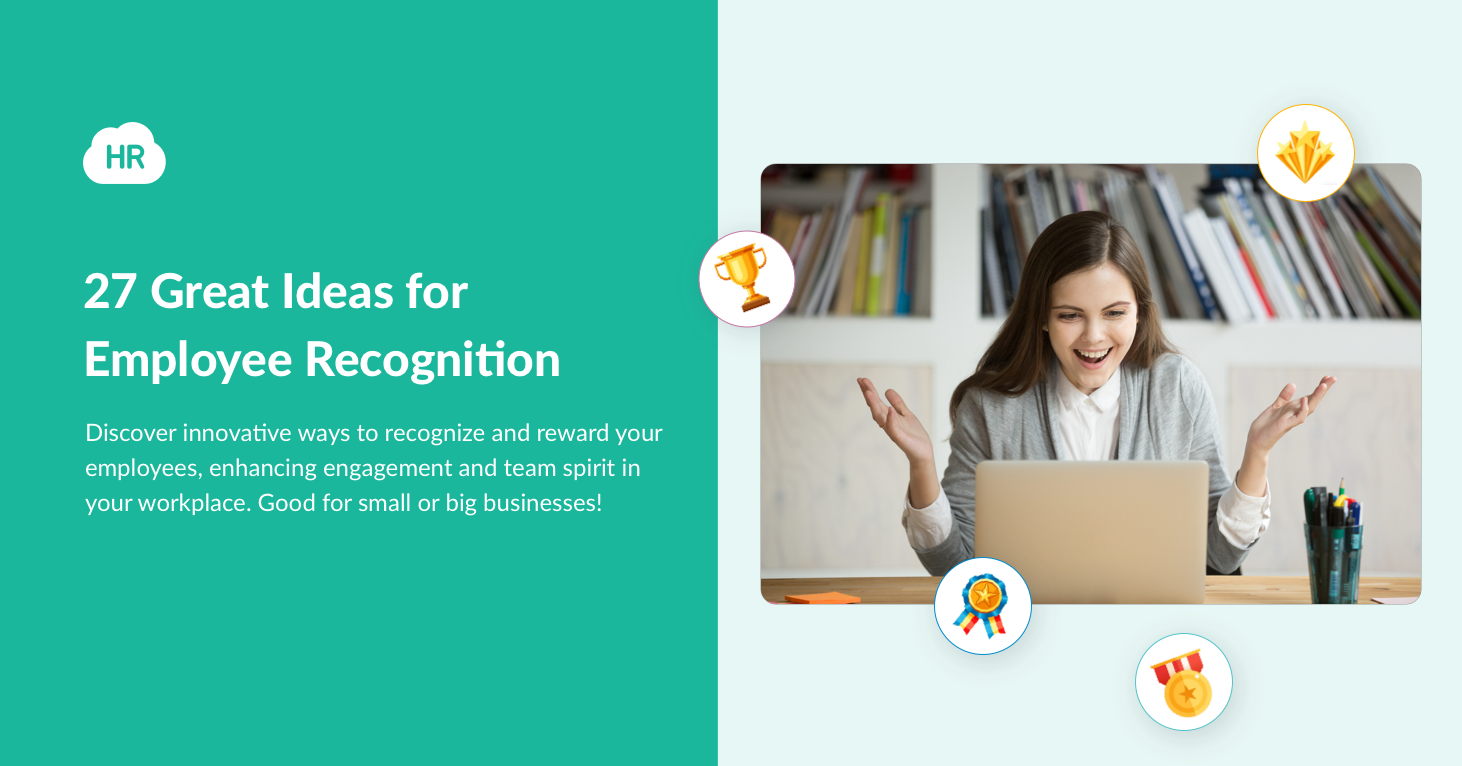


 Cut onboarding time
by 60%—here's the
Ultimate Checklist
that helped do it.
Cut onboarding time
by 60%—here's the
Ultimate Checklist
that helped do it.

Everyone appreciates being recognized for their efforts in the workplace. In fact, recognition is the most important motivator for 37% of employees, according to a survey from Great Place to Work. Not only does workplace recognition show that management cares about staff members, but this personal attention can also lead to a greater degree of loyalty and higher employee retention rates. Establishing a strong culture of recognition is crucial for fostering a positive and productive work environment.
Quick Overview
-
What is employee recognition vs. appreciation? Employee recognition acknowledges specific achievements and contributions, while employee appreciation expresses gratitude for an individual’s overall value and effort within the organization. Both are essential components of effective recognition programs.
-
What are the benefits of employee recognition? Employee recognition boosts morale, increases engagement, enhances productivity, and fosters loyalty. It's a key driver in creating a positive employee experience and improving overall company culture.
-
What should employees be recognized for? Employees should be recognized for achievements, exemplary performance, positive behavior, teamwork, and significant contributions that align with and further the organization's goals and values. Recognition examples can range from completing a challenging project to consistently demonstrating company values.
-
What is the best way to recognize employees? The best way to recognize employees is by providing timely, specific, and sincere acknowledgment of their hard work, in a manner that’s meaningful to them. This can be achieved through various employee recognition programs and employee rewards platforms.
From promotions and raises to employee care packages, here are some ideas for employee appreciation to help boost morale at work and show your team that their hard work doesn’t go unnoticed. These recognition examples can help you build an effective recognition culture in your organization.
Psst! Don’t forget to celebrate Employee Appreciation Day with special employee appreciation messages and activities!
1. Promotions, Raises, and Bonuses
Cash is king, and in the realm of workplace recognition, promotions, raises, and bonuses are some of the best ways to recognize and reward hard work. Financial incentives help retain top talent, as employees are more likely to stay with a company that recognizes their efforts and invests in their professional growth.
When setting up a system of promotions and raises, make sure you have transparent criteria based on performance, achievements, and specific competencies. Then, clearly communicate the reasons for a promotion or raise. It's important to regularly review and adjust compensation structures to remain competitive within the industry and maintain a strong employee retention strategy.
2. Points-Based Reward System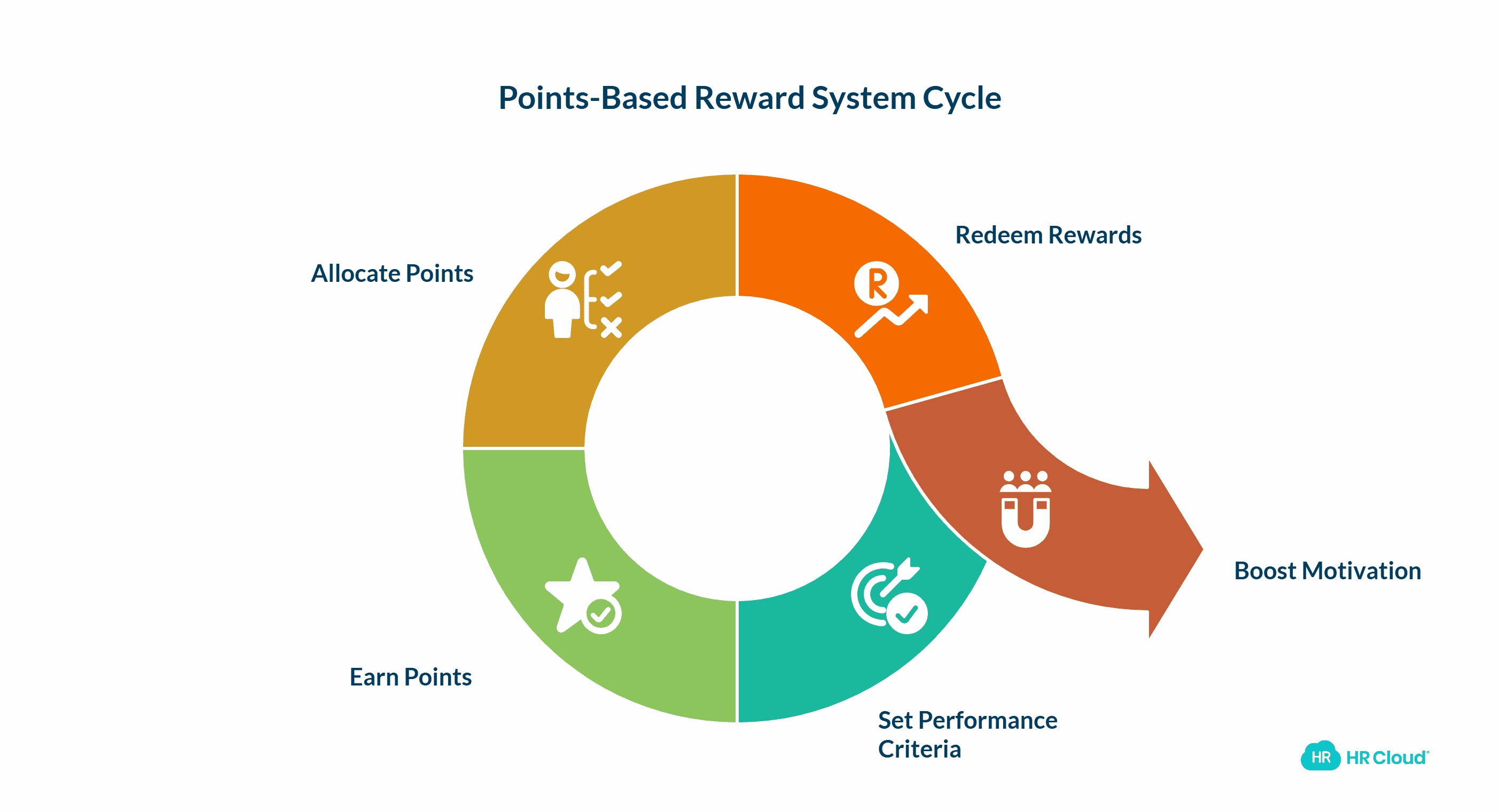
Many individuals become motivated when working toward a specific goal. This can come in the form of a points-based rewards system, a structured program where employees earn points for meeting specific performance criteria, behaviors, or achieving milestones.
Points are allocated based on the difficulty, importance, or impact of the achievement. Routine tasks might earn fewer points, while exceptional achievements or meeting critical targets might earn more. Points can then be redeemed for a variety of rewards, which might include gift cards, merchandise, extra days off, or other perks. This type of employee rewards platform can significantly boost employee motivation and performance.
3. Visible Leaderboards
Public recognition is another powerful tool, and leaderboards are one of the most well-known examples of this. Not only can this approach encourage a friendly level of in-house competition, but it also allows workers to track their progress in relation to their peers.
Leaderboards are primarily used in environments driven by sales, customer relations, and product promotions. Each of these responsibilities is associated with achieving a predetermined goal. Note that leaderboards can be used to single out the accomplishments of individual employees or entire teams, providing effective recognition at work.
4. Company-Wide Recognition
Many people enjoy being acknowledged in front of a group of their peers. Bundle emails, monthly meetings, seminars, and group messaging applications are all excellent opportunities to showcase how an employee has been performing in recent times. This can inspire others to adopt a similar work ethic, ultimately resulting in higher levels of productivity.
However, shyer or more introverted employees may not appreciate this, so make sure you tailor your recognition to their level of comfort. Consider using a mix of public and private employee recognition messages to cater to different preferences.
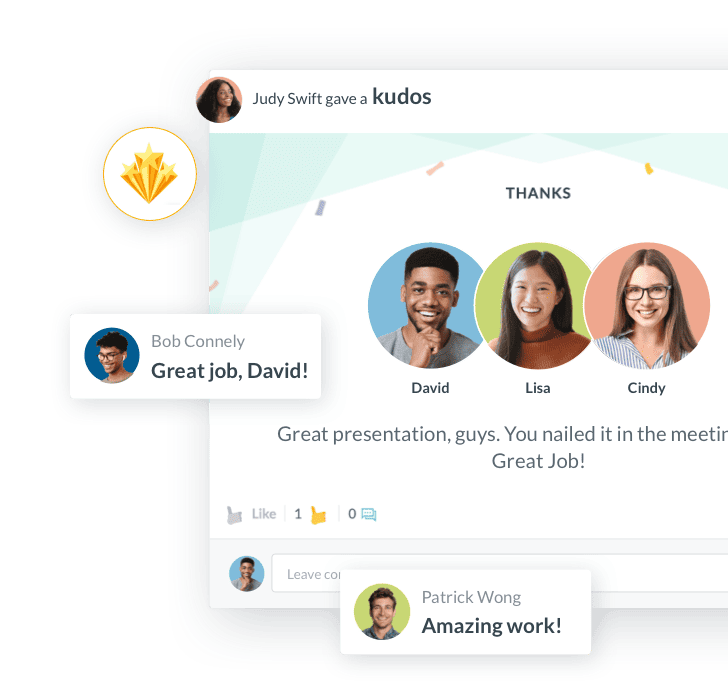
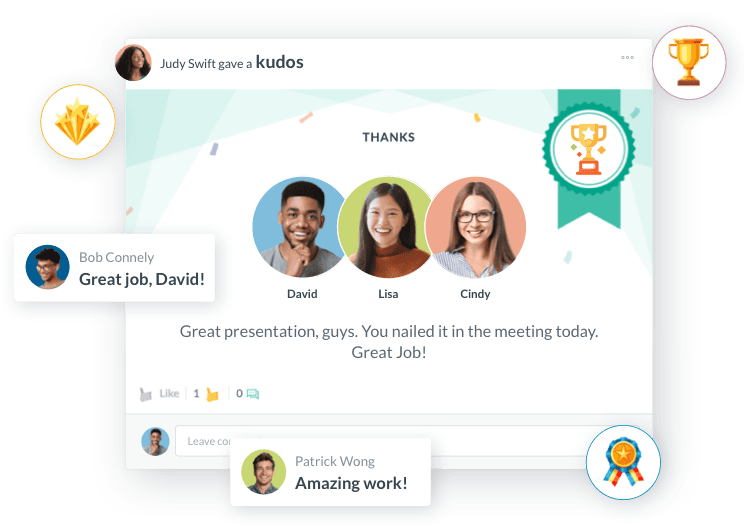
5. Employee of the Month
One great way to recognize employees and improve employee engagement is to implement an Employee of the Month award, suggests Adrian James, product manager for Featured. Some ideas for the employee of the month can be a shoutout on social media, free company swag, or a gift card of their choosing. This is a classic example of positive recognition that can boost morale and motivation.
6. Wall of Fame
By featuring photographs, names, and details of significant employee achievements, the Wall of Fame not only honors individual employees but also fosters a sense of pride and motivation among the workforce. It encourages a culture of recognition in a positive way, as employees see the acknowledgment of their peers and are inspired to contribute at similar levels. This visual representation of success stories can serve as a powerful tool for recognizing employees and reinforcing company values.
7. Handwritten Cards
Handwritten notes convey a sense of genuine appreciation and effort, adding a human element to the gesture and making it more memorable. It shows that management is willing to take the time to personally acknowledge an individual’s contributions, which can greatly boost the employee's morale and sense of belonging. Consider including appreciation quotes or personalized employee appreciation messages to make these cards even more impactful.
8. Tell Them “Thank You”
Telling employees "thank you" face-to-face is an often-overlooked yet powerful aspect of an effective employee recognition strategy. This direct form of appreciation fosters personal connections between management and staff. It's a simple yet meaningful way to recognize your employees and show appreciation for their hard work.
9. Gift Cards
Gift cards are practical because they can be easily tailored to suit the preferences of individuals, whether it's for shopping, dining, or entertainment. Moreover, gift cards can be given for a variety of accomplishments, from completing major projects to hitting performance targets, making them a convenient option for managers to promptly acknowledge and reward efforts. They're an excellent addition to any employee rewards program.
10. Premium Parking Spots
The exclusive nature of a reserved parking spot not only makes the daily routine easier but also serves as a constant, physical reminder of the employee's valued contribution to the organization.
This form of recognition can be particularly effective in larger companies where parking is at a premium, making it a coveted benefit that drives competition and motivation among staff. It's a unique way to recognize your team members and show appreciation for their efforts.
11. Peer-to-Peer Recognition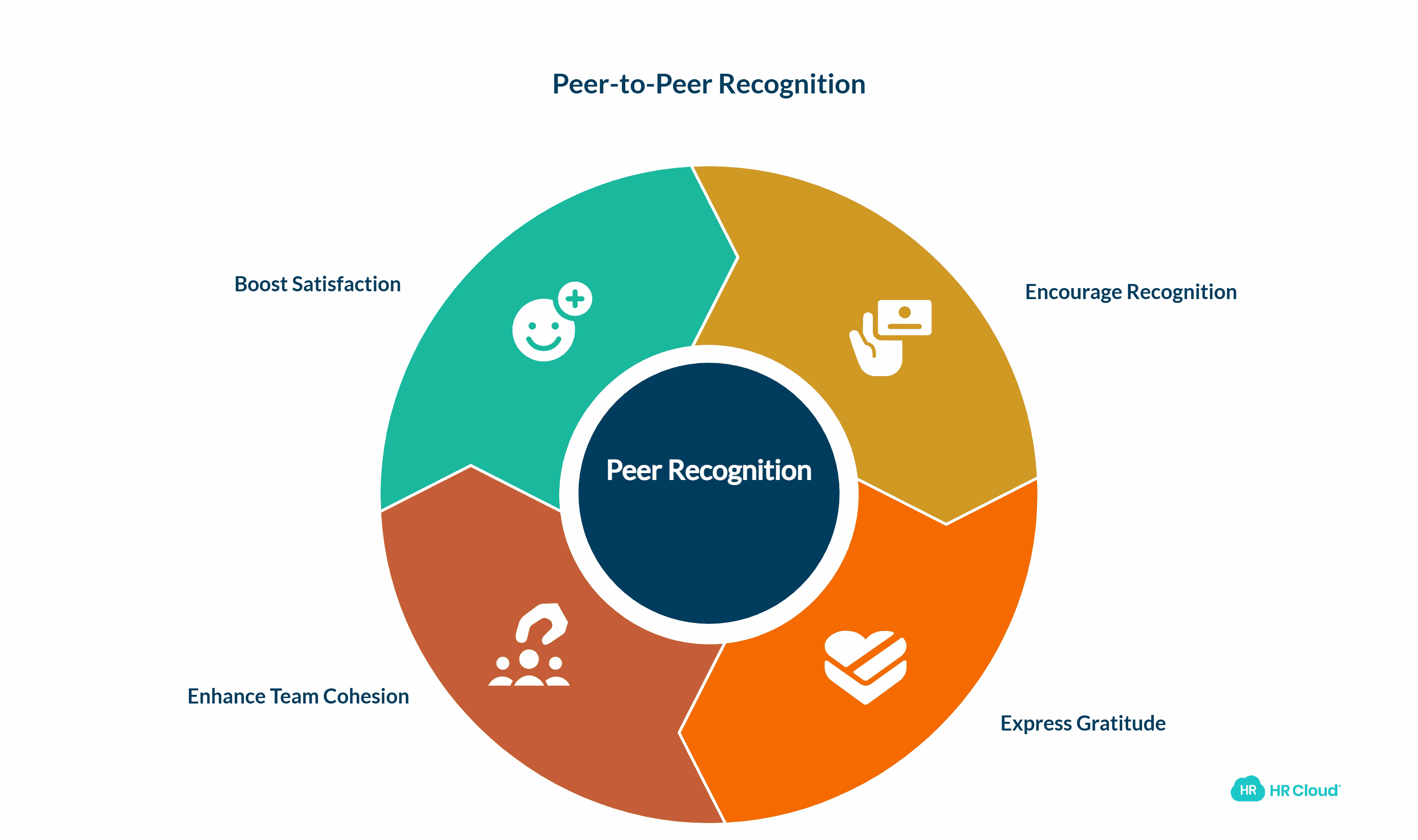
While it’s crucial that managers show appreciation for the efforts of individual employees, workers also rely on praise from other team members. Colleagues can recognize the efforts of one another as well as understand how the company itself is performing.
Encourage employees to write thank-you cards (provided by management) to their colleagues to express gratitude for help on a project, for going above and beyond, or for any support provided in the workplace. Or, during team meetings, set aside a dedicated time for employees to give shout-outs to peers who have made a positive impact on their work or helped the team achieve its goals. This peer-to-peer recognition example can significantly enhance team cohesion and overall workplace satisfaction.
12. Anniversary Commemorations
As many companies are struggling to put a cap on high turnover rates, praising workers who have reached specific longitudinal milestones (such as when celebrating a one-year anniversary) can go a long way in retaining top talent.
Some ideas include:
- Personalized gift that reflects the employee’s interests or needs, such as custom items, books, or tech gadgets
- Acknowledge the employee's anniversary during a team or company-wide meeting
- An award or plaque that employees receive on significant anniversaries, such as 5, 10, 15 years
- Video with messages from coworkers and leaders within the company
These anniversary recognitions not only celebrate the employee's loyalty but also reinforce the company's commitment to long-term employee relationships.
13. Extra Paid Days Off
While everyone is entitled to a certain number of paid holidays throughout the year, including a handful of bonus days to those who reach specific milestones is a great incentive.
These surprises will certainly be welcomed, and once again, they will inevitably motivate others to perform to similarly high standards. Plus, a bit of time away from the office will allow a hard-working employee to recharge their batteries so that future efforts are equally as impressive. This form of employee reward can significantly contribute to improved work-life balance and employee satisfaction.
14. Employee Care Packages
Personalized care packages that reflect an employee’s individual tastes show them you appreciate them and are paying attention to them as a person with interests outside of work, says Olivia Young of Conscious Items. Candies, snacks, gifts, coupons to local stores, and similar vouchers are all good options.
Another advantage of care packages is that they can be subsequently displayed within everyday work settings, reminding others what they can expect to receive for a job well done. These packages are excellent examples of meaningful recognition that goes beyond the typical workplace rewards.
15. Certificates of Recognition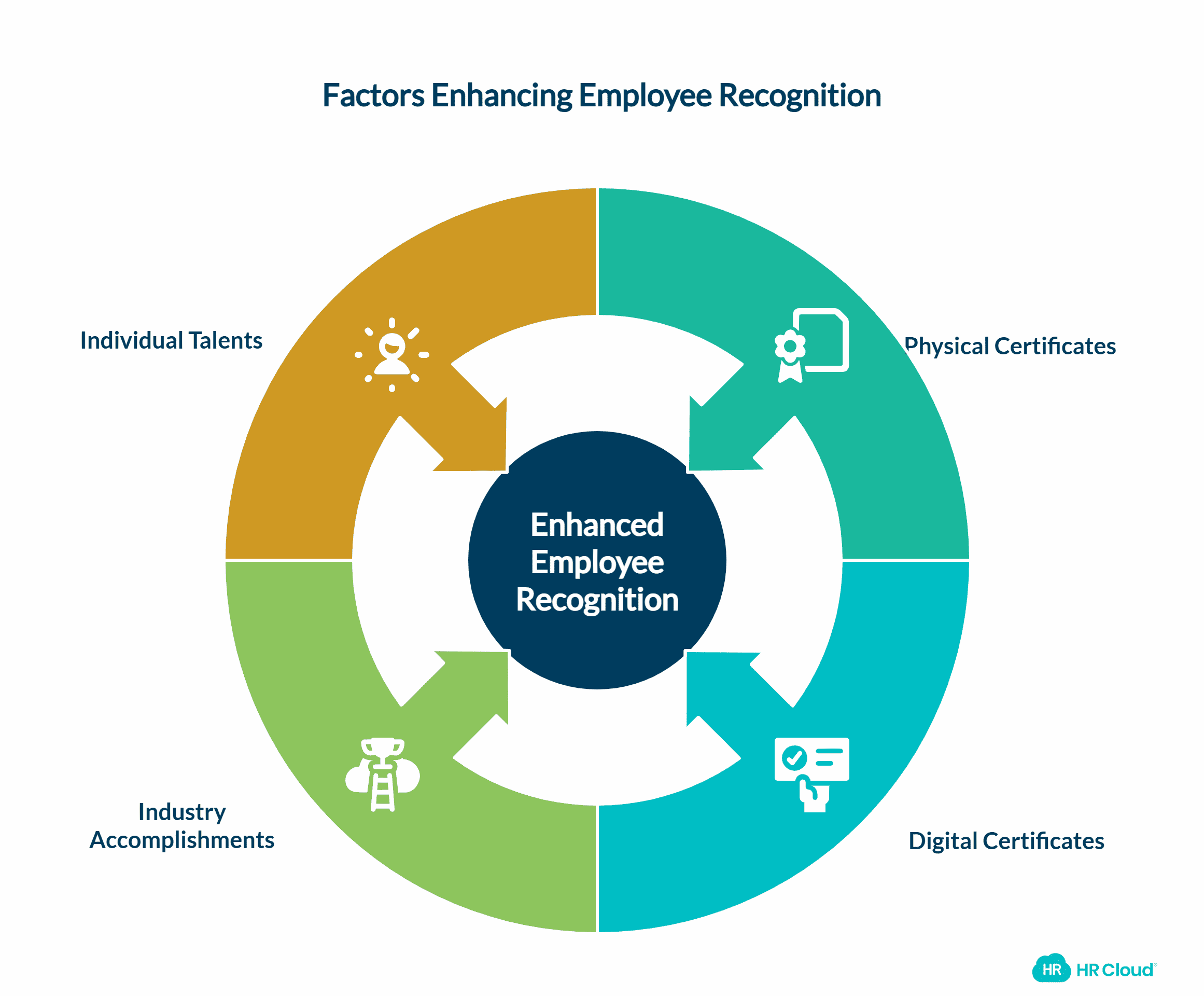
Certificates can be issued as physical gifts, digital documents, or both, and these more formal rewards can be displayed for years into the future. They often reflect specific industry-related accomplishments, and they can be worded in such a way as to highlight the talents of a specific individual. Certificates serve as tangible reminders of an employee's achievements and can boost their confidence and motivation.
16. Donation to Charity
One unique way for a company to recognize employees for a job well done is by offering donations to a charity of the employee's choice, suggests Michael Alexis, CEO of TeamBuilding.com.
For example, for Women's History Month, you can donate to a women's charity. It’s a powerful gesture that gives team members a sense of doing good both for the company and the wider world. This approach aligns recognition with corporate social responsibility, enhancing both employee satisfaction and company reputation.
17. Company Lunches
One unique way for a company to recognize its employees for a job well done is by taking them out to an office lunch of their choice, suggests Katie Kiernan of NUE.life. It can be either one-on-one, by department, or company-wide. Employees are able to celebrate their work wins while having a fun meal with co-workers. These social events can strengthen team bonds and provide a relaxed setting for meaningful interactions between colleagues and management.
18. Career Development Programs
Offering career development programs helps your employees grow and demonstrates the company's commitment to the long-term development of its workforce. This strategic recognition provides opportunities for skill enhancement and career advancement, fostering a more skilled and adaptable workforce. It's an investment in your employees that shows you value their growth and future within the company.
19. Networking With Company Leadership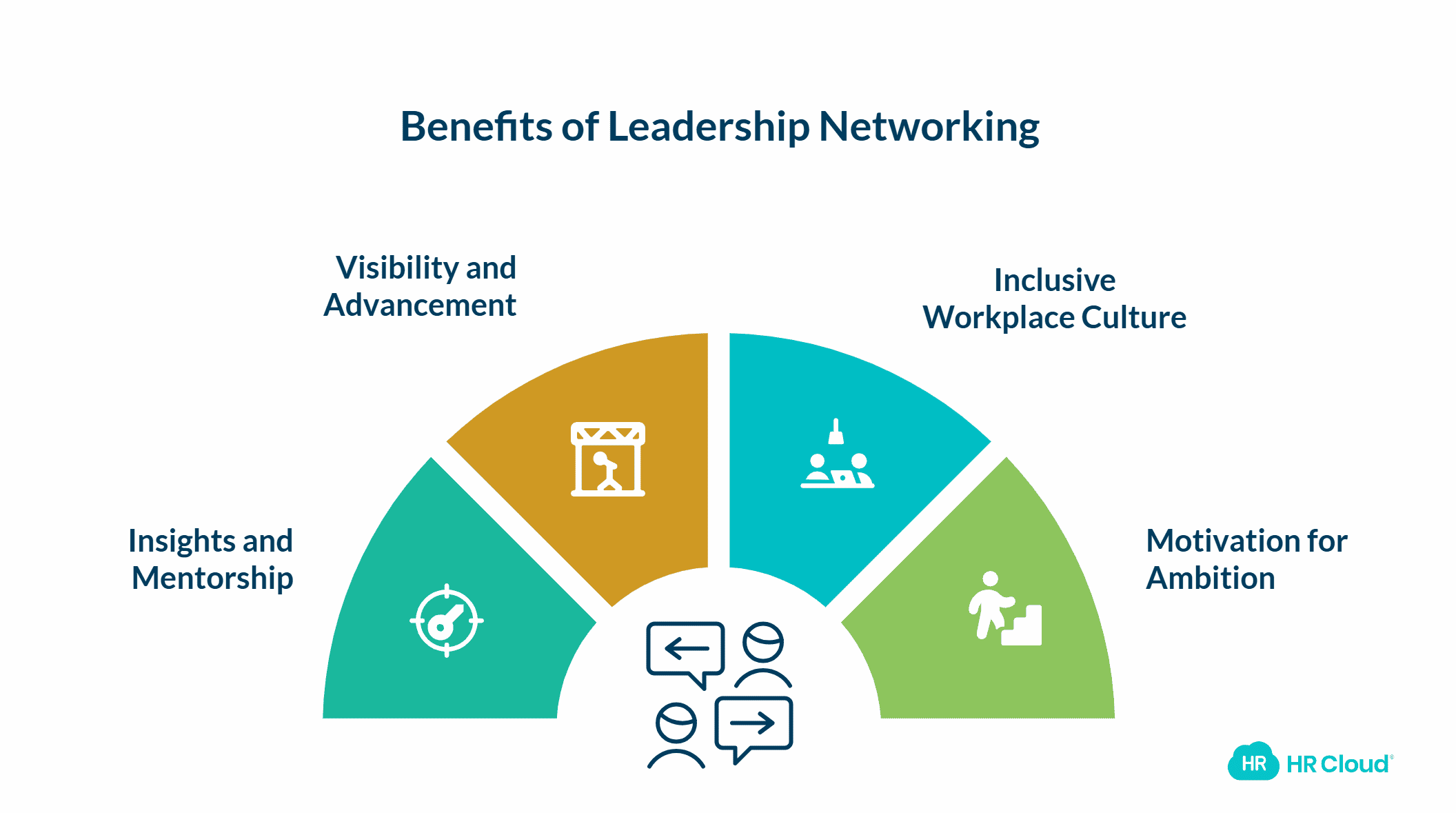
Access to company leadership allows recognized employees to gain insights, receive mentorship, and discuss their career aspirations directly with decision-makers, which can lead to more visibility and advancement opportunities within the organization.
Additionally, these interactions help build a bridge between staff and leadership, promoting a more inclusive and communicative workplace culture. This form of recognition can be particularly motivating for ambitious employees looking to climb the corporate ladder.
20. Shoutout Videos
Weekly or monthly announcements or regular update meetings are a great opportunity to honor hard-working employees. Prior to these videos, employees can submit shoutouts for their coworkers who have gone above and beyond on a project or just in their general work, says audience engagement strategist Jenn Fulmer. These videos serve as excellent peer recognition examples and can boost team morale.
21. Social Media Posts
By highlighting achievements on platforms like LinkedIn, Twitter, or Facebook, organizations can showcase their commitment to recognizing and valuing their staff, which can improve employee engagement and retention.
Social media shout-outs for employees also help build a positive brand image, demonstrating to potential employees and the industry at large that the company values its workforce. This public recognition can be particularly motivating for employees who appreciate wider acknowledgment of their efforts.
22. LinkedIn Recommendation
Writing a LinkedIn recommendation for an outstanding employee provides them with a valuable professional testimonial that enhances their credibility and visibility in their industry. This not only helps employees in networking and career advancement but also reflects positively on the company, showcasing its commitment to supporting and developing its workforce. It's a form of recognition that extends beyond the workplace and can have long-lasting benefits for the employee's career.
23. Wellness Day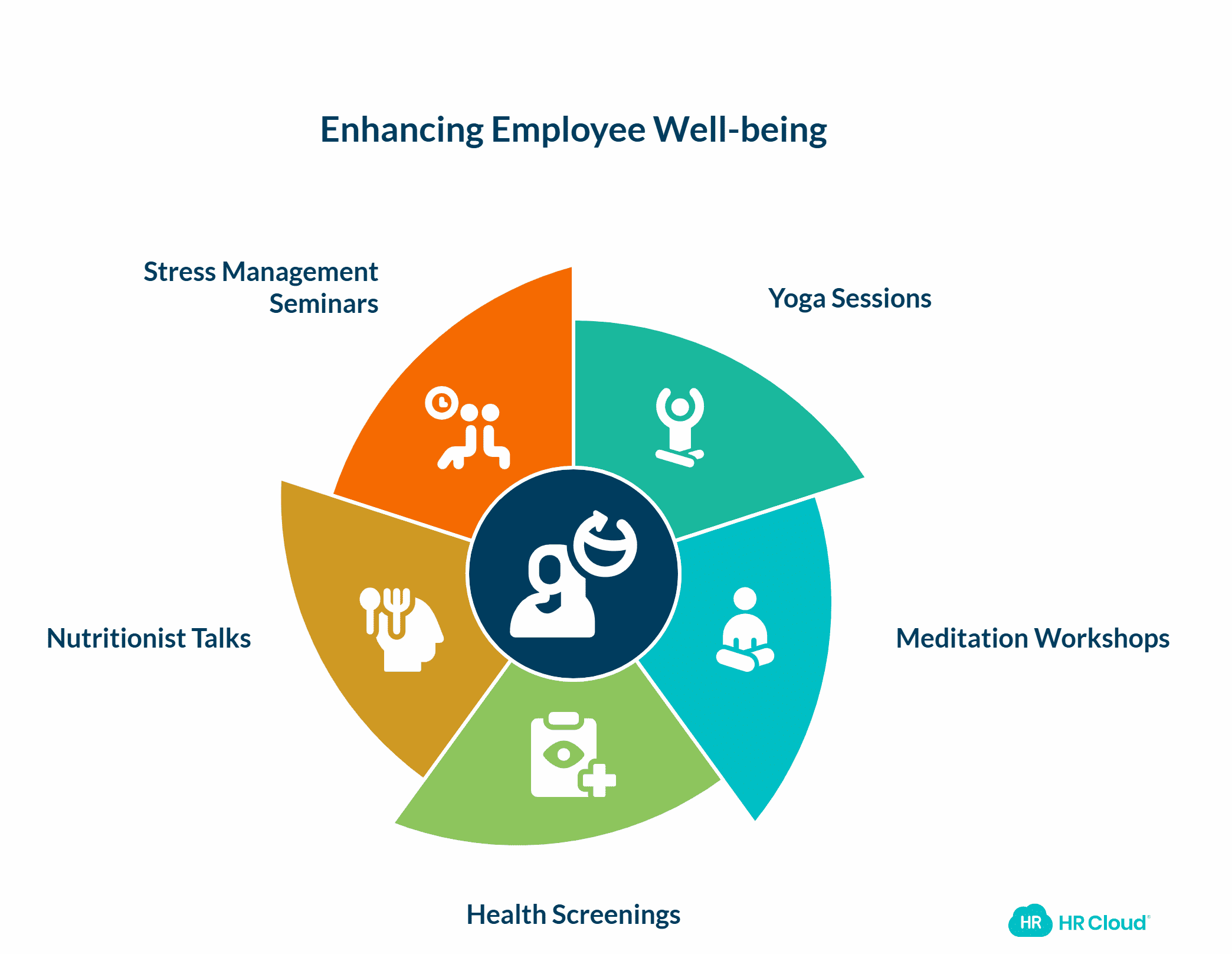
Investing in your employees’ well-being not only acknowledges their hard work but also provides them with a means to rejuvenate and de-stress, which can lead to increased productivity and job satisfaction.
An in-office wellness day could include activities such as yoga sessions, meditation workshops, health screenings, nutritionist talks, and stress management seminars. This approach to employee appreciation demonstrates a holistic concern for your team's well-being.
24. Traveling Team Trophy
Designate a trophy to be awarded periodically—weekly, monthly, or quarterly—to an individual or team that best exemplifies the company's values or achieves a significant milestone. Each person or team keeps the trophy until it’s passed on to the next winner. This not only boosts morale but also encourages everyone to strive for excellence. It's a fun and visible way to recognize your employees and foster a spirit of friendly competition.
25. Special Treats
Companies can offer a variety of treats to their employees, such as gourmet coffee, fresh fruit, pastries, ice cream socials, or catered lunches to show appreciation and boost employee morale. These small gestures can create moments of joy in the workday and show that the company cares about creating a positive work environment.
26. Company Swag
Companies can offer a range of branded swag to their employees, including items like T-shirts, custom hoodies, water bottles, and backpacks that showcase the company's logo. Additionally, tech gadgets such as USB drives, headphones, and phone chargers can be popular and useful gifts that employees appreciate and use regularly. Company swag not only serves as a token of appreciation but also promotes team unity and company pride.
27. Use an Employee Recognition Software
Using employee recognition software—like the one offered by HR Cloud—streamlines and improves the process of acknowledging and rewarding employees’ contributions. Such software enables continuous, timely, and public recognition, making it easy for peers and managers alike to commend individual and team achievements.
This digital platform can foster a culture of appreciation that’s visible across the organization, encouraging more frequent and diverse forms of recognition. Moreover, using software helps ensure that recognition is fair and inclusive, tracking all accolades to prevent bias and ensure everyone’s efforts are acknowledged. An employee recognition platform can be a game-changer in creating a robust recognition culture.
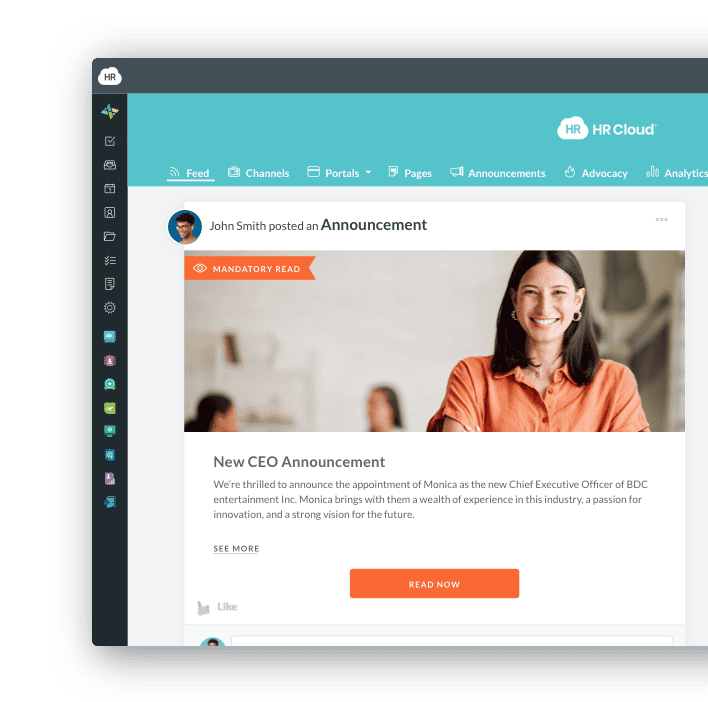
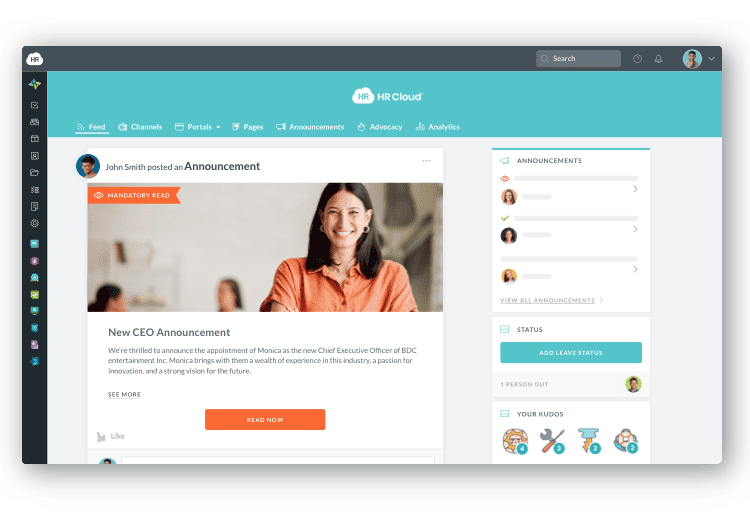
FAQs
What is employee recognition, and why is it important?
Employee recognition is the acknowledgment of an individual's or team's efforts, achievements, or contributions to the organization. It's important because it boosts morale, increases engagement, improves employee retention, and fosters a positive company culture.
What are the most effective ways to recognize employees?
Effective recognition methods include bonuses, peer recognition programs, public praise, personalized appreciation messages, career development opportunities, and meaningful rewards that align with the employee's preferences.
How is employee recognition different from employee appreciation?
Employee recognition typically focuses on specific achievements or behaviors, while employee appreciation is a broader expression of gratitude for an individual's overall value to the organization. Both are crucial elements of a comprehensive recognition culture.
What should employees be recognized for at work?
Employees should be recognized for goal achievement, exemplary performance, positive behavior, teamwork, innovation, and contributions that align with company values and objectives.
How often should you recognize employees?
Recognition should be ongoing, with a mix of immediate, informal acknowledgments (daily or weekly) and more formal recognition (monthly or yearly). Consistent, timely recognition is key to maintaining a strong recognition culture.
What are some low-cost employee recognition ideas?
Low-cost recognition ideas include handwritten thank-you notes, public acknowledgment in team meetings, a feature in company newsletters, extra time off, or small tokens of appreciation like gift cards or company swag.
What are the benefits of an employee recognition program?
Benefits include improved employee morale, increased productivity, better employee retention, enhanced company culture, stronger team cohesion, and overall improved employee performance and satisfaction.
How do you build a successful employee recognition program?
To build a successful program:
- Define clear objectives and criteria for recognition
- Involve employees in program design
- Ensure recognition is timely, specific, and meaningful
- Use a mix of formal and informal recognition methods
- Leverage technology like employee recognition platforms
- Train managers on effective recognition practices
- Regularly evaluate and adjust the program based on feedback
Author Bio: Greg Tuohy is the CEO of Cantec, a managed print service provider that also supplies business printers to businesses throughout the country. Docutec uses employee recognition strategies that benefit both employees and the business.
Keep Reading
Practical Strategies for Resolving Workplace Conflict Due to Miscommunication
Balancing Technology and the Human Touch in Employee Engagement
Companies are taking employee engagement very seriously because it is one of the ways of
Building Strong Teams: The Power of Team Bonding Exercises
Never overestimate the power of collaboration as a core element of effective team
